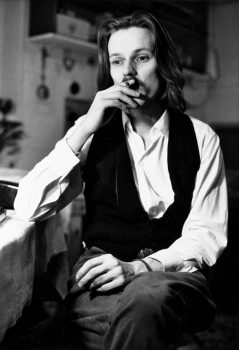Search results for "2010/02/2011/04/2009/10/writing-and-power"
Kaj Korkea-Aho: Gräset är mörkare på andra sidan [The grass is darker on the other side]
9 November 2012 | Mini reviews, Reviews
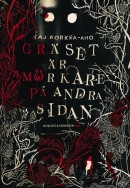 Gräset är mörkare på andra sidan
Gräset är mörkare på andra sidan
[The grass is darker on the other side]
Helsingfors: Schildts & Söderströms, 2012, 425 p.
ISBN 978-951-52-2999-1
€22.40, hardback
Finnish translation:
Tummempaa tuolla puolen
Helsinki: Teos & Schildts & Söderströms, 2012. 436 p.
Suomennos [Translated by]: Laura Beck
ISBN 978-951-851-482-7
€28.40, hardback
Benjamin’s life is turned upside down when he, in despair over his fiancée’s death, discovers things he perhaps didn’t want to know. A photograph taken by a speed camera minutes before the car crash shows that Sofie wasn’t alone in the car. A group of childhood friends reunite for Sofie’s funeral; dark secrets from the past which had until now lain hidden away and unexplained start to come out. What really happened when one of the villagers died in mysterious circumstances? Who murdered little Sidrid Ask? The enormous dark shadow filling people with chilling terror – is it Raamt, evil himself, walking amongst them again? Which should they be more scared of, the supernatural evil or the everyday and human that seems to be all around them? In his second novel the former television presenter and comedian Kaj Korkea-aho (born 1983) writes with great detail and a finely tuned ability to pitch his language. His novel is filled with fear, evil and supernatural phenomena, but at the same time with humour and warmth. The intrigue advances at an addictively fast pace. Korkea-aho takes his novel from biting parody, via horror to a beautiful yet serious depiction of the power of friendship.
Translated by Claire Dickenson
Mother-loves
31 March 1994 | Archives online, Fiction, Prose
Extracts from the novel Ihon aika (‘The time of the skin’, WSOY, 1993). Introduction by Suvi Ahola
In the hospital they stare at us, enquiringly, as if we are abandoning her. They look in turn at our mother’s half-conscious, ulcerous body, at the nurse who, curling her lip, cuts mother’s knickers, housecoat and apron off her, at us, the exhausted ones, who are now only at the beginning of our real work. They fill in their forms and ask their official questions; they do not know how anguished and relieved we shall be in a moment when we may leave our mother to them, that ironically smiling, wounded woman who is still, with her last strength, attempting to kick the nurse who is pouring warm water on her bloody feet.
I gaze at mother’s battered body with something like greed; I feel the same kind of curiosity toward this shocking sight as when I was four and we were in the bathroom together. I was shy, I tried to spy on mother’s fleshy body, her luxuriantly curving skin, through the mirror, but I was always left with the feeling that I had seen too little, I had been able to understand only a small part of what my eyes had registered. More…
Tellervo Krogerus: Sanottu. Tehty. Matti Kuusen elämä 1914–1998. [Said. Done. The life of Matti Kuusi, 1914–1998]
22 May 2014 | Mini reviews, Reviews
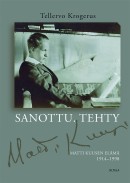 Sanottu. Tehty. Matti Kuusen elämä 1914–1998
Sanottu. Tehty. Matti Kuusen elämä 1914–1998
[Said. Done. The life of Matti Kuusi, 1914–1998]
Helsinki: Siltala , 2014. 856 pp., ill .
ISBN 978-952-234-194-5
€31.50, hardback
The folklorist Matti Kuusi vied for the status of the world’s leading researcher of proverbs with the Californian scholar Archer Taylor, his work extending from the shores of the Baltic Sea to Namibia’s Ovamboland. Proverbs revealed to him the deep structures of the human mind and showed that the nations of the world possessed a basis for mutual understanding. As a young man Kuusi read Spengler and predicted the destruction of the Western world. According to his ‘Kalevalan imperialism’, the Nordic region was to be the new world power. The war brought him to his senses: he understood that patriotism was mainly a matter of bland resilience. Professor Kuusi was a rigorous scholar, but also a provocative man of ideas who showed that pop music was today’s folk poetry. That idea received a mixed reception, but nowadays his department studies both rap music and ancient folk song. This biography by Tellervo Krogerus creates a rich portrait of a complex personality.
Translated by David McDuff
The lake
30 June 1988 | Archives online, Fiction, Prose
Järvi (‘The lake’), a short story, 1915. Introductions by Kai Laitinen and Pekka Tarkka
I travel the world, not out of any desire for adventure, but because that is the way things have happened. The best of my wanderings are in obscure, tucked-away regions, where life is humdrum and pitched in a low key. There I have no need to stave off nostalgia for the past by leading a hectic life: my days go by in stolid succession from season to season, I am an ordinary unimportant individual among all the rest. For long stretches of time my life does not strike me as being either dull or bright; I derive a certain satisfaction from its very emptiness. It is as though I were, by degrees and to the best of my ability, paying off a kind of debt. More…
In one hundred springtimes
23 November 2012 | Extracts, Non-fiction
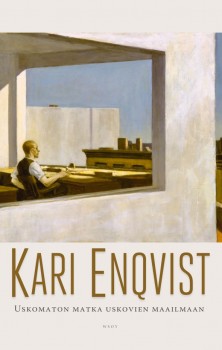 Extracts from Uskomaton matka uskovien maailmaan (‘An unbelievable journey into the world of the believers’, WSOY, 2012)
Extracts from Uskomaton matka uskovien maailmaan (‘An unbelievable journey into the world of the believers’, WSOY, 2012)
In his new book the writer, professor of cosmology, a scientist without a religion Kari Enqvist explores religiosity, how it manifests itself in present-day Finland, in various churches and parishes. How will the expanding scope of science and secularisation change the world and the forms of spirituality in the course of the next century?
When, in July 1969, Neil Armstrong climbed down the ladder on to the surface of the Moon, it was a huge propaganda coup for both the United States and the scientific world view. Manned space flights as a way of gaining knowledge are both ineffective and brain-numbingly expensive, but it is hard to imagine a stronger individual and universally understandable demonstration of the superiority of the scientific world view than an astronaut on the surface of a foreign celestial body. Everyone can recognise it as a triumph of both engineering technology and the hard sciences.
But the astronaut solution has been tested already, and I do not believe that space travel will expand our consciousnesses in the next century. It is possible that we will not even have visited Mars. Fantasies about manned flights to other stars are, in my opinion, utopian in the extreme and I do not really believe that humans as physical beings will ever leave the solar system. Journeys to the stars are inconceivably long and so expensive that they cannot be embarked on merely in order to fulfil the Buck Rogers fantasies of teenage boys. Carrying humans to the closest one, alpha Centauri, a mere four light years away, would take, at best, hundreds of years (we can dismiss rockets that travel at the speed of light as mere scientific fantasy). Even if deep-freezing to slow vital functions were possible, it would make as much sense to pay hundreds of billions to freight pig carcasses to the planets. For everything that human beings can do can be done better – and, more importantly, more cheaply – by machines. Even if the spirit were willing, the flesh is so weak that silicone beats it hollow.
So it is my guess that in place of the macrocosmos the scientific world view will seek consolidation in the microcosmos. As a cosmologist, I am not happy to admit this, but admit it I must. More…
Annika Luther: Brev till världens ende / Kirje maan ääriin [Letter to the ends of the earth]
3 March 2009 | Mini reviews
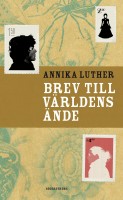 Brev till världens ände
Brev till världens ände
[Letter to the ends of the earth]
Helsingfors: Söderströms, 2008, 184 p. .
ISBN 978-951-52-2566-5
€ 18, paperback
Kirje maan ääriin
Helsinki: Teos, 2008, 197 p.
Suomentanut [Translated into Finnish by] Tarja Teva
ISBN 978-951-851-180-2
€ 21, paperback
This story involves the identity crisis of two boys, a discussion of the human ecological footprint and the growing loss of a relationship with nature. Viktor and Jeppe have been friends since childhood until the mysterious Maira upsets the boys’ relationship. Annika Luther (born 1958) is not content to write a traditional triangle drama – instead she seasons it with Viktor’s betrayal, an act committed in a fit of jealousy that has unforeseeable consequences. The novel’s power lies in its ever-increasing tension, as the trust between the boys breaks down. The plotline is occasionally unconvincing, but at the heart of the novel is the fickle human mind, stripped of all its trappings. The book received the 2008 Topelius Prize.
All the grace
21 February 2013 | Fiction, poetry
Poems from Huhtikuu (‘April’, 1932), Sateen jälkeen (‘After the rain’, 1935), Hunnutettu (‘Veiled’, 1936), Kaukainen maa (‘Distant land’, posthumous, 1937; all published by WSOY). Introduction by Vesa Haapala
ON THE SHORE
The wonderful pale clouds
cross the sky like wings.
Quiet and enchanting
the open water sings.
The sand has grown weary
of the waves’ caressing play.
Now come in perfect quiet,
now come here, right away…
17.3.1930 More…
The faraway island
31 March 2007 | Archives online, Fiction, Prose
Kaukainen saari, a short story from the collection Elämän ja kuoleman pidot (‘The feast of life and death’, 1945). Introduction by Juhani Niemi
For as long as they could remember, Hannes and Pekka had felt a great fascination for the lonely little island out in the open sea, clearly visible from the shore at home. Thickly overgrown with unusually tall pines, the island was like a wondrous bouquet in a great vase of sea. It was in sunshine from morning till night. At the very instant that the tip of the sun peeped up over the horizon, its rays were already caressing the tops of the little island’s tallest trees, and when the sun set behind the blackness of the islands to the west, those same treetops were tinged with a bright, hot glow. The winds and storms touched it more vehemently than any other place. No matter which direction the wind came from, the island was always defenseless, but, happily, ready for anything. In stormy weather the waves flung themselves against its stony shore and sometimes nearly as high as the treetops. The wind roared in the dense branches of its trees more wildly and violently than anywhere else. When it rained, it was as if the island were hiding among the grey curtains of mist, looming dimly and secretly. In the autumn, when all the other woods were splashed along their flanks with yellow and russet, and gradually undressed until they were half-naked, the little island’s tall pine trees rose up from the grim autumn surf as lush and green as always. And in the winter, when the sea froze and snow covered everything in a mantle of white, the island dressed itself in ice and rimy frost like royal robes covered in millions of sparkling diamonds. More…
Contemplating the cosmos
30 September 2006 | Fiction, poetry
Poems from Valkoiseksi maalattu musta laatikko (‘A black box painted white’, WSOY, 2006). Introduction by Pertti Lassila
Good morning, murmuring universe,
dim tortuous thingamybob
with your moving and unmoving parts,
which every day need
new instructions for use
even though the previous ones
were not all that clear, because the article itself
is perpetually modifying its rules of behaviour.
There are threats that our details are being checked,
exhortations to be good, to wait,
wait and believe,
to stay outside at night
in abstract space
till the next numerical series. More…
Change the words
30 March 2008 | Fiction, poetry
Poems from Bul bul (‘Bulbul’, WSOY, 2007). Introduction by Karri Kokko
Opening
Which street was it? A question in a poem doesn’t demand an answer, it’s
itself, like that accurate filter, a blood-soaked liver –
The city was a giant, budging my brains, the fireworks’
ash trailed down to earth, the clowns screeched, a book’s face
was waiting like a child’s face,
and they began swarming out, releasing themselves from signposts,
neon signs, from the pages of a closed book (smelling of a dried
ranunculus), from graves, from a woman’s abhorrent womb – More…
Pekka Lassila: Maininki [Surge]
5 May 2015 | Mini reviews, Reviews
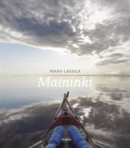 Pekka Lassila
Pekka Lassila
Maininki [Surge]
Helsinki: Tammi, 2014. 278 pp., ill.
ISBN 978-951-31-8126-0
€36, hardback
This book is a journal of a ‘survival project’: a continuous kayak voyage of 1,300 kilometres along the Finnish coast, from the eastern border (Russia) to the northwestern one (Sweden). Pekka Lassila (born 1959) is a photojournalist who, in an attempt to find a way out of the crisis of losing a job he had heald for thirty years, set off on his voyage in May, when the ice had only just melted. Nights were spent mostly in a tent; all washing up had to be done with sea water. Lassila blogged daily for newspapers by the power of his solar-charged phone and tablet. This solitary endeavour seems slightly obsessive at first – but the stories about the geography and history of the places passed by and the descriptions of the personal daily marine routines turn out to be interesting, never repetitive. The shallow west coast, the Gulf of Finland, even proves to be dangerous: the waves, growing rough, threaten to crush the kayak on the rocks, but Lassila’s paddling skills and luck save him. The photographs, taken each day, illustrate the voyage well (even though it is irritating that there are no captions!). Reaching his goal, after 31 days, Lassila manages to complete his ‘project’ – but confesses that he may only later fully understand the reasons why he set out.
Homo ludens, vita brevis
18 March 2011 | Letter from the Editors
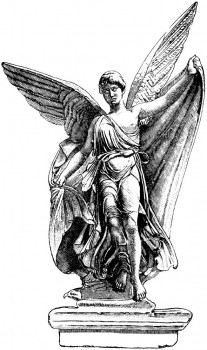
Goddess of victory: charioteer and runner Nike (constructed from the damaged statue of Nike of Paionios, from ca. 420 BCE). Photo: Wikimedia
No one should ever start a piece with ‘already the ancient Greeks…’ , but here goes:
Already the ancient Greeks practised the noble arts of sport. The Romans extended the cultivation (their word!) of culture to leisure, amusing themselves by throwing Christians to the lions. Formula F1 came a couple of thousand years later, as did post-modern art, sitcoms and reality TV, whose presenters take the place of lions and whose celebrities are today’s Christians.
The Olympics, founded by the Greeks, were in full swing as early as the seventh century BCE, until the Christian Roman Caesar Theodocius I banned them as irretrievably pagan in the year 393. However, they were revived 1,500 years later. More…

